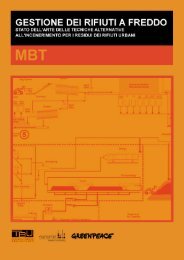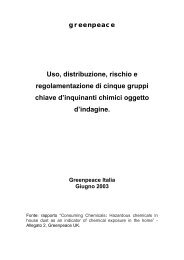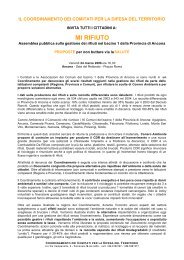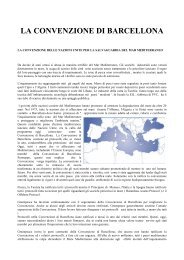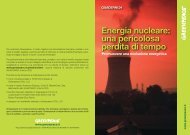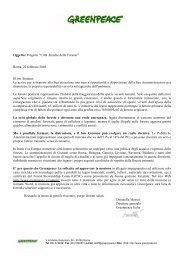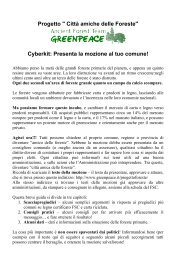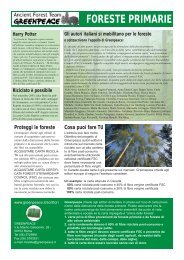Zero Waste by Robin Murray, Greenpeace Environmental Trust 2002
Zero Waste by Robin Murray, Greenpeace Environmental Trust 2002
Zero Waste by Robin Murray, Greenpeace Environmental Trust 2002
You also want an ePaper? Increase the reach of your titles
YUMPU automatically turns print PDFs into web optimized ePapers that Google loves.
independent variables in the model of light government –<br />
have not been independent at all. Prices in the waste<br />
market have not been adjusted to reflect externalities, nor<br />
have the flows of public and private resources redirected<br />
<strong>by</strong> government. Neither have planning procedures<br />
remained independent. Rather, they have been determined<br />
<strong>by</strong> an implicit policy that, far from encouraging recycling,<br />
is in danger of setting limits to its expansion and to the<br />
economic and environmental opportunities it opens up.<br />
Thus on the one hand ‘light government’ has argued that<br />
waste policy should be led <strong>by</strong> a market adjusted to take<br />
into account environmental externalities. On the other, the<br />
market has been adjusted to reflect a policy formed to<br />
meet the Brussels Directives, in consultation with an<br />
existing public and private industry whose traditional<br />
interests could only be changed <strong>by</strong> a radical revision of<br />
incentives. There is a circularity here. The system of<br />
incentives that could help transform an old industry into a<br />
new one is set with the advice and on behalf of the old<br />
industry to reflect what currently exists. This is the source<br />
of the deep conservatism at the heart of British waste<br />
policy: it is to be found neither in the civil service, nor in<br />
the waste companies, nor the disposal authorities, but<br />
rather in a system of government that as far as waste is<br />
concerned cannot accommodate the force of the new.<br />
Thirdly, it is finance and statutory regulations rather than<br />
indicative targets and information that have influenced the<br />
conduct of the industry. As many local authority waste<br />
managers pointed out, the 25% recycling target for 2000<br />
was not mandatory and therefore had low priority in cash<br />
limited councils. The provision of improved waste data<br />
(however necessary) made little impact on waste strategy,<br />
nor did the production of recycling plans. Regulations are<br />
only as strong as their enforcement and penalties, and<br />
both have been weak. It is compulsion and cash – whether<br />
in the form of grants, subsidies, taxes or penalties – that<br />
have changed behaviour. They need not be alternatives –<br />
regulation versus market instruments – but can be linked<br />
to each other, as the permit mechanism illustrates.<br />
Lastly, the experiments with privatising the government’s<br />
public financial functions have each been problematic. The<br />
most notorious has been the Landfill Tax Credit scheme.<br />
Under the scheme, the Treasury forgoes up to 20% of the<br />
revenue due from the tax, if the landfill company chooses<br />
to pay the money to an environmental trust for a range of<br />
specified purposes. This is a variation on eighteenth<br />
century tax farming – in this case the government farming<br />
out grant giving to the owners of landfill.<br />
Not surprisingly, the scheme (which is worth £100 million<br />
per year) has been subject to gross abuse. Landfill<br />
companies and their trade associations have established<br />
their own trusts, which they have used to advance their<br />
interests (including waste-related road building, research<br />
on landfilling and the promotion of incineration). They<br />
have used the grants for targeted PR, and have restricted<br />
sums going to recycling and to community competitors.<br />
Local authorities with access to the funds (for example<br />
through clauses in disposal contracts) have used them to<br />
finance public services. All this has happened in spite of<br />
provisions designed to restrict both the waste companies<br />
and the local authorities from abusing the funds. Given<br />
the Treasury’s concern to control public spending and link<br />
it to outcomes, it is astonishing that some £400 million,<br />
which would otherwise have been paid to government<br />
over the five years of the scheme, has been allowed to be<br />
used on miscellaneous projects or the promotion of waste<br />
company interests.<br />
The second experiment, the issue and sale of Packaging<br />
Recovery Notes, designed to implement the packaging<br />
regulations, has also faced difficulties:<br />
• conflicts over information. The scheme depends on<br />
accurate figures for the quantity of packaging in the<br />
waste stream, both in aggregate and for each<br />
‘obligated party’. As might be expected, the amount<br />
declared <strong>by</strong> the industry has been less than that<br />
estimated <strong>by</strong> the Environment Agency, and has given<br />
rise to lengthy haggling between the two;<br />
104<br />
<strong>Zero</strong> <strong>Waste</strong><br />
105



